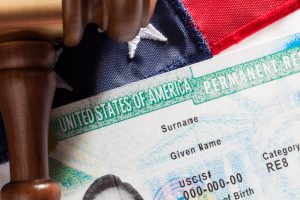The Critical Need For Pro Bono Immigration Work
Substantial attention is needed to deliver fairness to those who soon are to need it the most.
 Any pending increase in immigration deportation proceedings will require an uptick in vigilance, a rededication to due process and fairness. Democracy has to step-up. Those who are vulnerable, who face removal from the United States, who are at risk of returning to dangerous and uncertain futures in a home country from which they fled, are entitled to our democracy’s historic promises.
Any pending increase in immigration deportation proceedings will require an uptick in vigilance, a rededication to due process and fairness. Democracy has to step-up. Those who are vulnerable, who face removal from the United States, who are at risk of returning to dangerous and uncertain futures in a home country from which they fled, are entitled to our democracy’s historic promises.
Regardless of politics, the laws as currently written entitle immigrants to certain rights when their fates are in the hands of the judicial system. Regardless of politics, many of those facing possible removal are entitled to be here, to find the safety they risked their lives to reach. But those promises mean almost nothing unless democracy serves the people who need it most urgently. And the judicial system, simply, will not work unless those in it have lawyers to represent them. For that to happen, several crucial steps must be taken.
First, the particular realities of millions have to be acknowledged. They are not dangerous felons, rather they are terrified children, mothers, and families who were assaulted, left widowed and orphaned by brutal violence, raped, extorted, kidnapped, threatened in countries where law enforcement was either unable or unwilling to help them. They risked their lives to escape, enduring horror on a journey with no certain outcome. Many are children, fleeing alone. Many are mothers and young children, frightened and running for their lives. Others still are families, leaving behind all they knew for the chance to live safely together. Many of the children are eligible to remain in the United States and be granted Special Immigrant Juvenile Status. Many more are eligible for asylum. Most do not speak English, all are terrified, none can navigate a complex system of justice and laws in a language they do not understand.

Law Firm Business Development Is More Than Relationship Building
Second, even though the laws may entitle them to be in this country lawfully, virtually none are entitled to have a lawyer appointed to represent them. In recent years, 70 percent of all who face deportation do not have attorneys. Almost half of them were ordered deported at their very first court hearings. However, of those who managed to find representation, only 4 percent were ordered to be removed at that early stage. Only one in 15 families without lawyers were even able to file the correct papers with the court. With the advent of the so-called “rocket dockets” that were instituted to deal with the women and children crossing the U.S./Mexico border, the need for lawyers has become only more critical.
Third, the overwhelming need for attorneys requires an overwhelming need for the private bar to volunteer their pro bono services, be trained, and represent, as a community, as many clients as they possibly can. More than 500,000 cases are pending in the immigration courts. Increased enforcement will put the system further and further behind. There are as many as 750,000 recipients of temporary status and work permits under the Deferred Action for Childhood Arrival program whose protections may soon be reversed. Although many lawyers and law firms already have increased their pro bono activities, tens of thousands more will be needed. The usual suspects will not be enough. The big firms, the immigration practitioners, the many other solid volunteers from throughout the legal community already are doing their part. Efforts to delve far deeper into the private bar, to solicit many more new volunteers, must be made by bar associations, elected officials, legal aid organizations, and anyone else who can help.
Fourth, and most important, substantial funding for legal services organizations must immediately be found and infused into a service delivery system that already is stretched beyond capacity. The efforts of the private bar to provide support can go only as far as the shoulders of the legal aid community can carry them. Pro bono volunteers need to be trained. Critically, they need to be supervised and mentored by expert practitioners. Cases need to be screened and evaluated by experienced immigration attorneys. Clients need to be systematically interviewed, analyzed and referred in an effective and thorough manner. This complex process can only be accomplished if our country’s legal aid organizations have the funding they need to significantly ramp up, expand their expertise, grow their capacity, create more leverage through their pro bono efforts, and maintain their quality.
The promise of our democracy is built on the effectiveness of the judicial system. It is the most directly responsive branch of government, the arm of our Constitution that ensures liberty and justice. Substantial attention is needed to deliver fairness to those who soon are to need it the most. Politics do not matter. The law demands nothing else.
Sponsored

Generative AI at Work: Boosting e-Discovery Efficiency for Corporate Legal Teams

Law Firm Business Development Is More Than Relationship Building


Generative AI at Work: Boosting e-Discovery Efficiency for Corporate Legal Teams
 David A. Lash serves as Managing Counsel for Pro Bono and Public Interest Services at O’Melveny & Myers LLP. He can be reached at [email protected]. The opinions expressed are his alone.
David A. Lash serves as Managing Counsel for Pro Bono and Public Interest Services at O’Melveny & Myers LLP. He can be reached at [email protected]. The opinions expressed are his alone.
Photo via Getty Images
Sponsored

Curbing Client And Talent Loss With Productivity Tech








